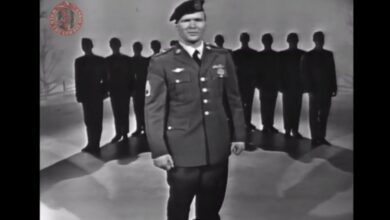The heartfelt duet “Don’t Cry Daddy” by Elvis and Lisa Marie Presley may bring you to tears.
“Don’t Cry Daddy” is celebrated as one of Elvis Presley’s most touching and emotionally impactful songs, resonating with audiences from various generations. The lyrics, crafted by Mac Davis, tell a poignant story of a father mourning his wife’s death while striving to comfort his children. The song’s exploration of grief and healing is beautifully intertwined with a tender melody, making its message deeply relatable to anyone who has faced loss.
Elvis Presley, born on January 8, 1935, became a significant figure in popular music, bridging genre and cultural divides. Known as the “King of Rock ‘n’ Roll,” his diverse style fused elements of rhythm and blues, country, gospel, and pop, resulting in a sound that was both groundbreaking and timeless. By the time he recorded “Don’t Cry Daddy” in 1969, he had already solidified his status not only as a music icon but also as a cultural icon. His remarkable ability to convey emotion in his songs became one of his hallmarks, with “Don’t Cry Daddy” showcasing the depth of his artistry.
Released at a time when country music was rising in popularity, the song’s touching lyrics resonate with many families facing the challenges of grief and the complexities of maintaining connections with loved ones during tough times. It poignantly contrasts the pain of losing a loved one with the need to remain strong for those who rely on you. Elvis’s powerful performance captures this duality, mixing soft vocal delivery with an emotional intensity that strikes a deep chord.
In 1997, a notable moment in music history occurred with the posthumous release of a duet of “Don’t Cry Daddy,” featuring Elvis’s only daughter, Lisa Marie Presley. Born on February 1, 1968, Lisa Marie inherited her father’s musical legacy. Her collaboration on this iconic song not only serves as a heartfelt tribute to her father but also allows her to express her own feelings of loss and connection. This duet acts as a bridge between their legacies, emphasizing the enduring musical bond they share.
Advancements in audio technology made it possible to blend Lisa Marie’s contemporary voice with her father’s original recording, resulting in a unique listening experience that honors the past while celebrating the present. This innovative approach allowed fans of Elvis to experience the song anew, while younger listeners could appreciate the King’s legacy through the lens of his daughter. The careful crafting of the duet ensured that the harmony felt authentic and resonated with audiences.
The emotional story within the duet is enriched by Lisa Marie’s contribution, as her vocals add a new layer of meaning to the lyrics, reflecting the ongoing nature of familial love and loss. Her presence in the song serves as a reminder that even in times of grief, hope and connection can thrive, resonating with those who have endured similar pains. The collaboration emphasizes music’s ability to provide comfort and healing.
Elvis’s gift for emotional expression is evident throughout his body of work, and “Don’t Cry Daddy” stands out as an essential piece that illustrates his connection with listeners’ feelings. The song’s heartfelt themes extend beyond personal experiences, tapping into universal emotions of love, loss, and resilience. The power of the duet reinforces how music can elevate emotional narratives, offering solace to those who share similar experiences.
In a time where music often serves as a means of escape, “Don’t Cry Daddy” stands as a tribute to the beauty of genuine human emotion expressed through song. Its touching message continues to resonate, fostering intimate connections between the music and its audience. The collaboration between Elvis and Lisa Marie exemplifies how familial legacies can manifest in artistic expressions, preserving their stories for future generations.
Ultimately, the enduring legacy of “Don’t Cry Daddy” affirms music’s ability to heal, providing insight and companionship during sorrowful times. The song’s encouraging message to resist despair speaks directly to families coping with loss, reminding them of the strength found in unity. Through the combined voices of Elvis and Lisa Marie, the song crosses temporal and spatial boundaries, linking listeners to shared themes of grief and hope.
In summary, the duet symbolizes the intersection of musical heritage and familial connections, showcasing how music can inspire and comfort. It captures the essence of Elvis Presley while allowing Lisa Marie to establish her own identity within the same creative space. The lasting influence of “Don’t Cry Daddy” resonates not just as a classic in the country music genre, but also as a significant marker in the artistic legacy of the Presley family, eternally imbuing the hearts of listeners with the beauty of love and remembrance.





